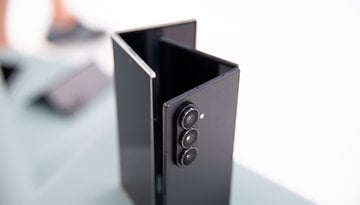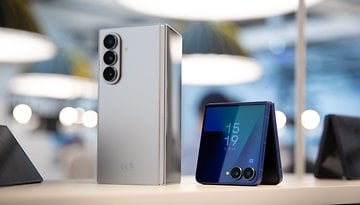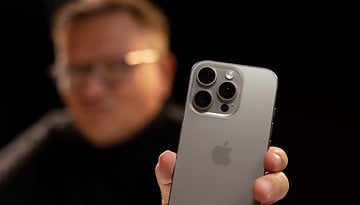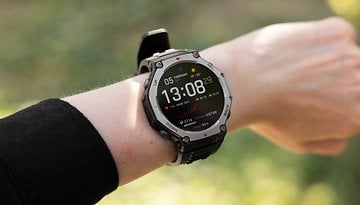Poll of the week: How important is the vibration motor in your smartphone?
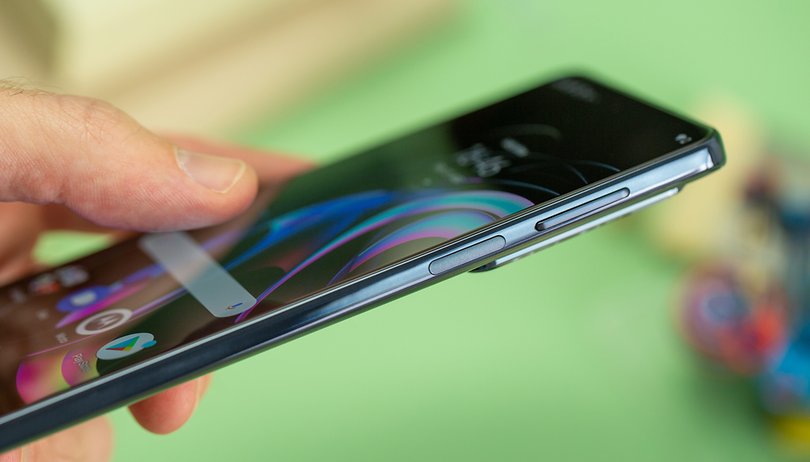

Bzz Bzz! The results of our survey of the week are in. We asked you on all four NextPit domains about your attitude towards vibration motors in mobile phones. Is the quality important to you or do you not use the vibration alarm at all? Find out the answer here!
Our last poll of the week was a little affair of the heart. Because in the NextPit editorial sessions we have often discussed the importance or unimportance of vibration motors in mobile phones. Therefore, I found it very exciting to find out how important the quality of the vibrating components is to you and whether you use your mobile phone in vibration mode at all.
For this purpose, I received 1,273 votes to my two polls in the past days. Now I would like to go into the respective results. So let's start with my first question:
Do you appreciate good vibration motors in mobile phones?
The majority of readers on all four NextPit domains were in favor of good vibration motors in mobile phones in my first poll. But the majority of supporters was not too big. In Brazil and France the answers were almost balanced with 52% to 48%. In Germany, most people voted for the importance of good vibration motors, with almost 70%.
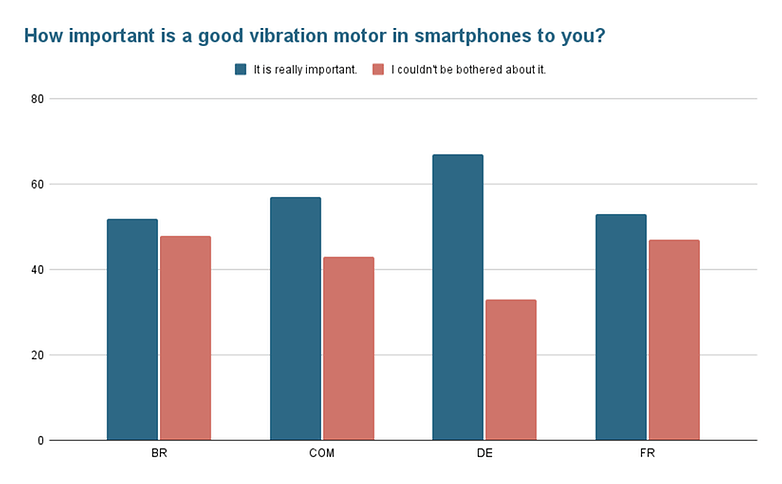
In the comments and in the second poll, however, a suspicion I already had when designing the poll was confirmed. I personally attach a lot of importance to good vibration motors, because I use my mobile phone mostly in vibration mode. I also always have vibration enabled for key tones and for Android gestures. So how many are like-minded to me on this topic?
Vibrate, ringing, or silent: How is your phone set up?
I find the results of the second poll all the more exciting. It seems that very few people have completely disabled feedback for notifications and calls. In all countries except Brazil, the answer "Silent" was the least common. In Brazil and Germany, vibration mode reigns supreme, while in the US and India, most people operate their smartphones loudly.
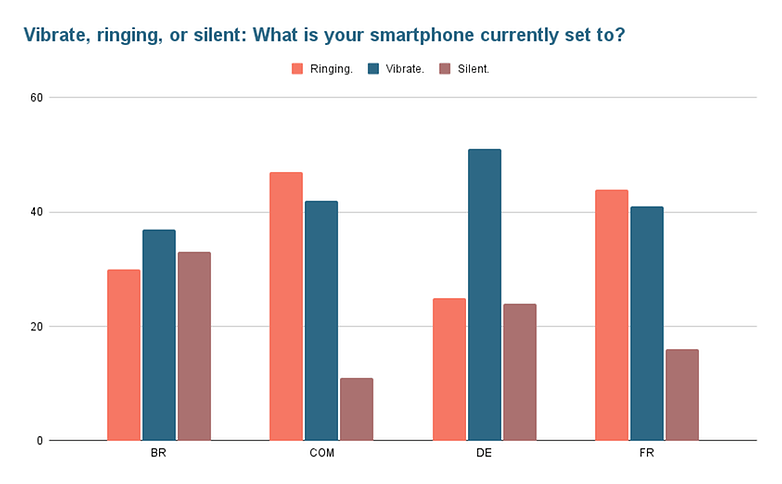
If I were a few years younger and had even more time to spend on my field of study, I'd be on fire right now. Are there cultural differences that cause people in the US and India to share incoming notifications with the world? And are phone tones frowned upon in Brazil, for instance?
In our comments, I could see more individual reasons for this. Some readers let their smartwatch vibrate instead of their mobile phone, while others deactivate sounds and vibrations so as not to be disturbed. In the run-up to my survey, I almost expected that my colleagues in the open-plan office would otherwise kill me if I activated the vibration or that loud ringtones are frowned upon.
Perhaps the survey shows how personal our preferences are when it comes to our own mobile phone settings, or how much the Corona pandemic and lockdowns have contributed to individualism. But maybe I'm getting lost in wild theories, when it's really just about a little motor that makes a smartphone wobble in your pocket.
Nonetheless, I thank you for participating and hope you saw the results of my survey even with cell phone sounds turned off. If not, please subscribe to our Telegram group or our RSS feed for new articles!
Original Text
Our latest poll of the week is by no means an idea that was dug up somewhere from our summer brainstorming archives! In the NextPit editorial team, the topic of vibration motors in smartphones surface frequently, especially when we receive a new handset for review purposes. I unashamedly admit that usually, I'm the one who brings this topic up. Yet one more reason to ask the community, "How important is the quality of the vibration motor in your smartphone?"
I've already asked about the relevance of selected features several times in our "Poll of the Week" series. I find it extremely exciting in my own research to find out just how important IP certification is or whether the megapixel count in smartphone cameras matters to you. Today, we would like to talk about the quality of the vibration motor, which I think is tied in intrinsically to the value of a smartphone.
This is because if I were to fork out $1,000 or more for a smartphone and it sounds like a broken VW Polo whenever I receive a new notification while the handset is on the table, I would feel shortchanged. Expensive cars and even digital cameras have sound designers for mechanical parts, so why not phones aswell?
It's not just me, as I first learned about this from the NextPit community when I reviewed the Oppo Find X2 Neo. Reader Tim praised me at the time for including this feature in my review. Funnily enough, I've been discussing vibration motors in smartphones with Tim's namesake in NextPit, my ex-colleague Tim Metzger from Allround-PC, ever since we started working together.
The reason is simple: vibration motors provides us with constant, subtle feedback throughout the day, whether we're hitting the right keys or whether our crush has finally texted us a reply to our last message. They are too much of an important part of the user experience to have a rickety cheap motor powering this feature.
How do smartphones actually vibrate?
A quick digression on what actually makes smartphones vibrate over the years. Underneath the hood of many of our smartphones lies a small motor that basically has an intentional flaw built right in. That's because its axis of rotation doesn't run quite perfectly through its center of gravity, resulting in it being imbalanced. When disassembled, the motor would bounce around on the table, but when it is installed in a secure location in a smartphone, then the motor makes it vibrate.
A decisive factor to consider when it comes to the quality of the vibration is motor itself, precise control, and of course, the quality of its workmanship. If a smartphone is made of glass and all components have been built with a degree of precision that runs into millimetres, the vibration is then transferred precisely to the pocket or the palm of your hand. If cheap plastic components are used, the smartphone will rattle loudly in front of you. German magazine TechnikNews depicted in an entertaining comparison of how different vibration motors in various phones perform upon ringing and what types of vibration motors are out there.
Fun fact: Back in the day, cell phone manufacturers sold batteries that could also be used to retrofit vibration motors in said handsets. Isn't that an interesting piece of trivia that could be used in any social function?
Right here, right now: How important are vibration motors to you?
Let us get straight to business. Just how important is the quality of the vibration motor in a smartphone give when you receive a call, type, or send a message? Let me know in this poll:
In the newsroom, my preoccupation with vibration motors is always met with laughter. Camila, for instance, replied that it's the first thing she turns off when she receives a new smartphone. So here's a follow-up question, as I guess everyone has a different opinion about this matter:
That's all for the questions that I wanted to ask this week. I've rarely been so curious about the outcome of one of our polls, and am genuinely excited to take a look at its results after this weekend is over. After all, how often do you get the opportunity to find out if you're a weirdo based on empirical data? See you on Monday, when we'll meet once again to evaluate the results!








